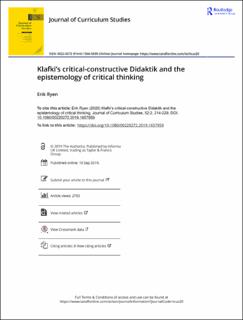Klafki's critical constructive Didaktik and the epistemology of critical thinking
Peer reviewed, Journal article
Published version

Permanent lenke
https://hdl.handle.net/11250/2775234Utgivelsesdato
2019-09-10Metadata
Vis full innførselSamlinger
Originalversjon
Journal of Curriculum Studies. 2019, 52 (2), 214-229. https://doi.org/10.1080/00220272.2019.1657959Sammendrag
What can educators working to develop critical thinking (CT) in their classrooms gain from engaging with the German/Scandinavian tradition of Bildung-centred Didaktik? This article takes up the challenge of how to develop an epistemology of CT that is relational and contextual and gives students the possibility of engaging in ethical debates about social justice, as called for by critical pedagogues such as Lim (2011, 2015). The backdrop is an increasing focus on CT as a prominent educational goal in the Organisation for Economic Co-operation and Development and beyond, a development that makes it important to clarify the epistemological basis for how CT can be developed in schools and the ethical foundations and implications of the different approaches in the field. The article compares the epistemology of Matthew Lipman’s seminal work on CT, Thinking in Education (2003), with Wolfgang Klafki’s critical-constructive Didaktik. To highlight and critically examine the relations on which the two approaches are built, a combination of Aristotelian epistemology and the ‘Didaktik triangle’ is used. The analysis shows there are valuable insights to be gained from Klafki’s theory to further develop an epistemology of CT.
